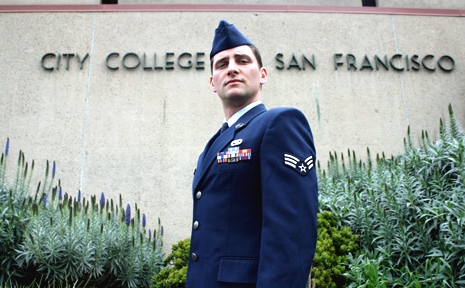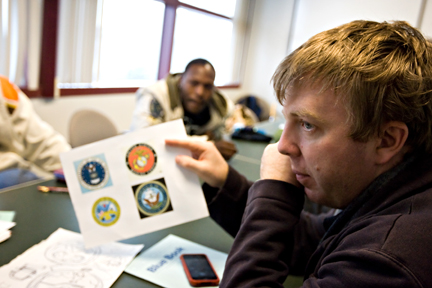GI Bill payments stall, student veterans suffer
By Greg Zeman, Tania Cervantes and Robert Romano
The Guardsman

The GI Bill, the United State’s promise of support to its returning veterans since World War II, is not serving the needs of all student veterans in a timely fashion.
According to the City College Veteran’s Educational Benefits Office, approximately 400 City College students are relying on the Veterans Administration to pay for their education and housing expenses through Chapter 33 of the GI Bill — called the “Post 9-11 GI Bill.”
“The big difference in this new GI bill is money is given according to zip codes and students that attend City College receive more money as San Francisco is a more expensive city,” said Fay Caroline, a counselor with the City College veteran’s educational benefits office. “What we are now seeing is a big influx of students under the 33 chapter that have chosen City College because they will get more money.”
She added that the massive influx of students has caused Chapter 33 benefits to kick in late — often six to 10 weeks behind schedule.
Iraq and Afghanistan Veterans of America reports that more than 1.7 million veterans have served in Iraq and Afghanistan, which could explain the large number of veterans seeking GI Bill benefits.
Student veterans have faced additional difficulty due to extensive budget cuts to public education.
In order to receive GI Bill benefits, veterans must be enrolled in approved classes. Those unable to register for classes or those who have had their classes cut are left without any money.
Because summer semester has been canceled, veterans seeking benefits during summer semester will have to attend another college, possibly one that qualifies them for less benefits — or they may not receive benefits at all.
Jordan Towers is a City College history student who joined the Marines after graduating high school.
“I wasn’t ready for college and I needed funds,” Towers said. “Money is a huge reason why people join.”
Towers had to wait three months to obtain his benefits during his first semester at City College.
“They provide, but they are really slow,” he said.
Some student veterans like Anthony Meade have faced eviction because of these delays in payment.
“I received the benefits only with intense hardships,” Meade said. “I did get them, but only after Senator Dianne Feinstein’s office intervened to the Veterans Affairs on my behalf, and that was really the reason I got paid.”
A veteran who who will be referred to as George because his claim with the VA is still pending, , said he is tired of waiting.
“They keep telling me, ‘just a little longer,’ but my landlord doesn’t want to hear that anymore,” George said. “It’s not like I’m asking for a handout. I was promised these benefits when I enlisted.”
George said when he was in boot camp, he was required to set up a checking account with either the Pentagon Federal Credit Union or Bank of America. George chose Bank of America, which denied his request for a loan to make up for late VA payments.
“It’s not like I even want to take a loan when people owe me money,” he said, adding that nobody is answering his calls at the national VA education office in Omaha, Neb. and that he keeps getting a recorded message.
Nobody could be reached at the national VA office for comment. A recorded message explained that the office was, “getting an unprecedented number of claims.”
Not all student veterans have faced such difficulty. Moe Awobo, a City College dance student and seven year Air Force veteran, said that being in the military helped her overcome personal obstacles and get an education.
“My life was not going in a direction I liked. I was in a rut, my life had stalled,” Awobo said. “Now I’m definitely getting school paid for. It’s nice to be able to study what I love.”

According to the decision in Levy v. Brown — a 1993 case heard by the U.S. Court of Veteran’s Appeals — verbal agreements between a military recruiter and a recruit do not constitute an actual contract. Many people who speak with military recruiters on campus do not realize that, unlike their decision to serve as a soldier for eight years, promises made to them by recruiters are not legally binding.
“When I spoke to a recruiter, they told me that women don’t serve in combat and so I should not worry,” said Omaira Duran, a City College student considering enlistment in the military. “I know they sugarcoat everything, but if I actually don’t serve in combat, then I think it can be a good experience.”
Awobo said that the idea that women do not see combat is ridiculous.
“My recruiter was a female and she never told me that,” she said. “A lot of my homegirls have set foot in Baghdad and Afghanistan. Once you put on that uniform, there is no distinction. If they need a body, then you’re going.”

Comments are closed.